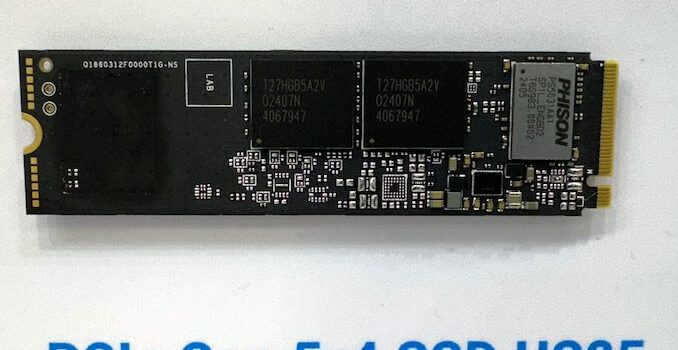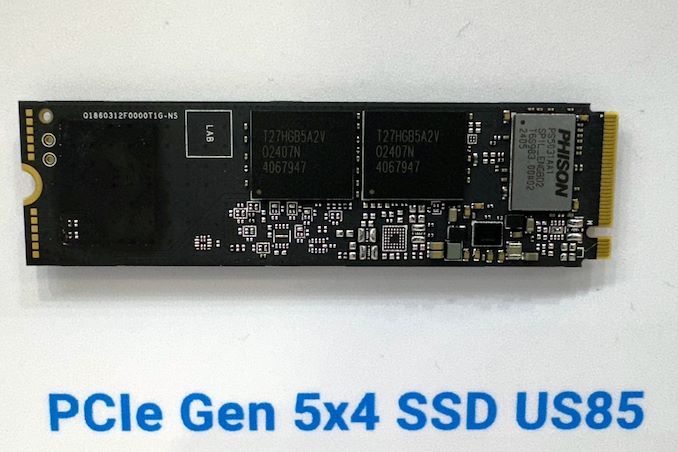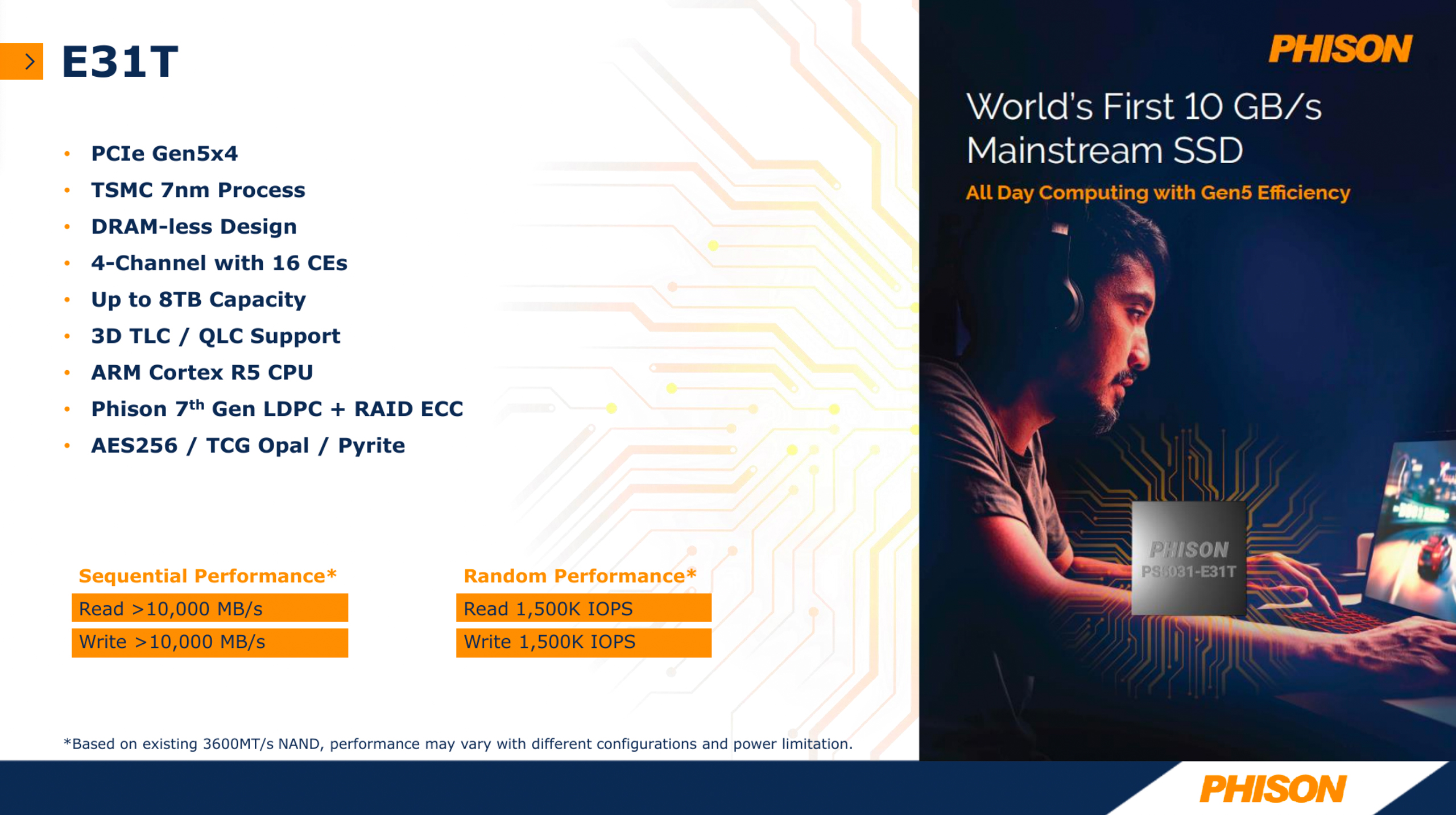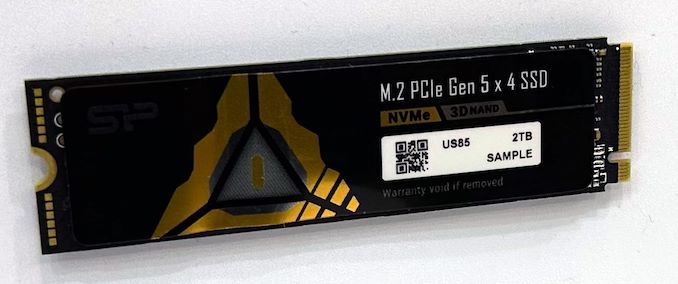Cheaper PCIe 5.0 x4 SSDs Incoming: Silicon Power Demos Phison E31T-Based SSD
Although consumer SSDs based on Phison’s PS5026-E26 controller have been on the market for almost a year and a half now, the class-leading drives still carry a distinct price premium, and to some degree that’s because it’s still one of the only options for a PCIe 5.0 SSD. But it looks like the situation is going to change in the coming quarters, as SSDs based on Phison’s PS5031-E31T controller are incoming, with at least one Phison customer demoing an E31T drive on the Computex show floor.
Phison’s PS5031-E31T controller uses two Arm Cortex-R5 cores accelerated by the Andes N25 CoXProcessor, just like its bigger brother Phison PS5026-E26. But this is where their major hardware similarities seem to end. The new E31T controller is a DRAM-less controller with four NAND channels (16 CE targets) that is produced on one of TSMC’s 7nm processes, whereas the E26 is an eight-channel controller made on TSMC’s 12nm production node.
Besides cutting down on memory channels and the use of DRAM to drive down costs, the E31T also picks up a couple of new tricks by virtue of being nearly two years newer. In particular, the E31T sports Phison’s 7th Generation LDPC error correction technology, as opposed to the E25’s 5th-gen LDPC
| Phison NVMe SSD Controller Comparison | |||||||||
| E31T | E27T | E21T | E26 | E18 | |||||
| Market Segment | Mainstream Consumer | High-End Consumer | |||||||
| Manufacturing Process |
7nm | 12nm | 12nm | 12nm | 12nm | ||||
| CPU Cores | 2x Cortex R5 | 1x Cortex R5 | 1x Cortex R5 | 2x Cortex R5 | 3x Cortex R5 | ||||
| Error Correction | 7th Gen LDPC | 5th Gen LDPC | 4th Gen LDPC | 5th Gen LDPC | 4th Gen LDPC | ||||
| DRAM | No | No | No | DDR4, LPDDR4 | DDR4 | ||||
| Host Interface | PCIe 5.0 x4 | PCIe 4.0 x4 | PCIe 4.0 x4 | PCIe 5.0 x4 | PCIe 4.0 x4 | ||||
| NVMe Version | NVMe 2.0 | NVMe 2.0 | NVMe 1.4 | NVMe 2.0 | NVMe 1.4 | ||||
| NAND Channels, Interface Speed | 4 ch, 3600 MT/s |
4 ch, 3600 MT/s |
4 ch, 1600 MT/s |
8 ch, 2400 MT/s |
8 ch, 1600 MT/s |
||||
| Max Capacity | 8 TB | 8 TB | 4 TB | 8 TB | 8 TB | ||||
| Sequential Read | 10.8 GB/s | 7.4 GB/s | 5.0 GB/s | 14 GB/s | 7.4 GB/s | ||||
| Sequential Write | 10.8 GB/s | 6.7 GB/s | 4.5 GB/s | 11.8 GB/s | 7.0 GB/s | ||||
| 4KB Random Read IOPS | 1500k | 1200k | 780k | 1500k | 1000k | ||||
| 4KB Random Write IOPS | 1500k | 1200k | 800k | 2000k | 1000k | ||||
Phison itself calls its E31T platform ‘the first mainstream 10 GB/s platform,’ which pretty much gives a performance indicator for some of the upcoming inexpensive PCIe Gen5 SSDs. As for random performance, we are talking about 1.5M IOPS per second, which is in line with performance offered by some of enterprise-grade PCIe Gen4 SSDs.
Meanwhile, a Silicon Power ad at Computex indicates that that the company at least hopes to get to 12 GB/sec with its “US85” drive. Which at 4 NAND channels would require pairing up the controller with cutting-edge 3200 MT/sec NAND. It’s a bit of an odd pairing given the mainstream, cost-conscious status of the E31T controller, but then the savings on the controller supporting DRAM can be invested back into the NAND on the drive itself. And more importantly, with 12 GB/sec reads and writes, Silicon Power’s US85 SSD will be able to compete against earlier E26-based drives that are still being sold on the market, which brings this product to a whole new level. Though Silicon Power will have to be able to procure enough fast 3D NAND to meet demand.
Both Phison and Silicon Power expect E31T to start shipping in Q4, so by the start of next year, mainstream SSDs should be receiving a nice speed boost.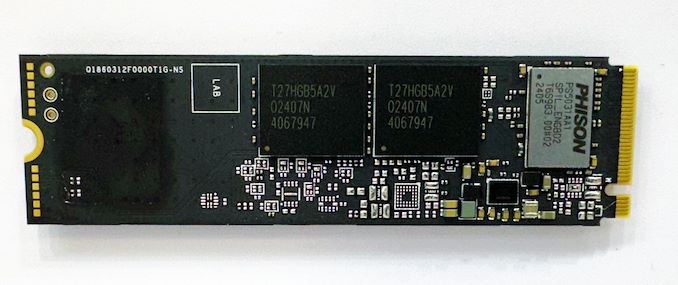
Source: Recent News

